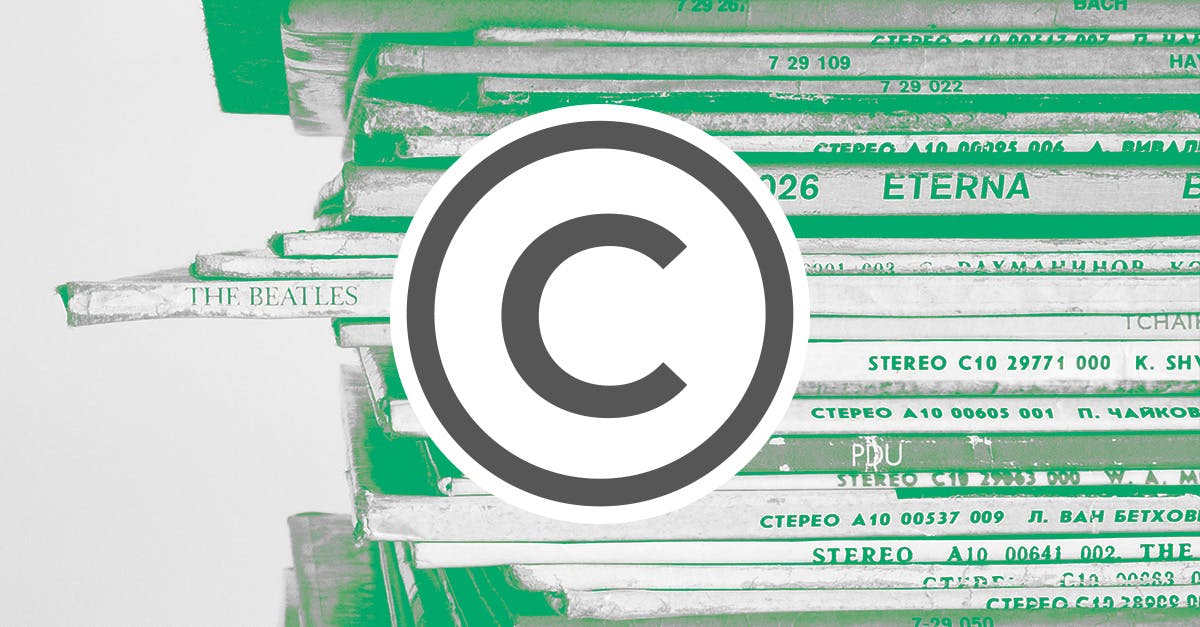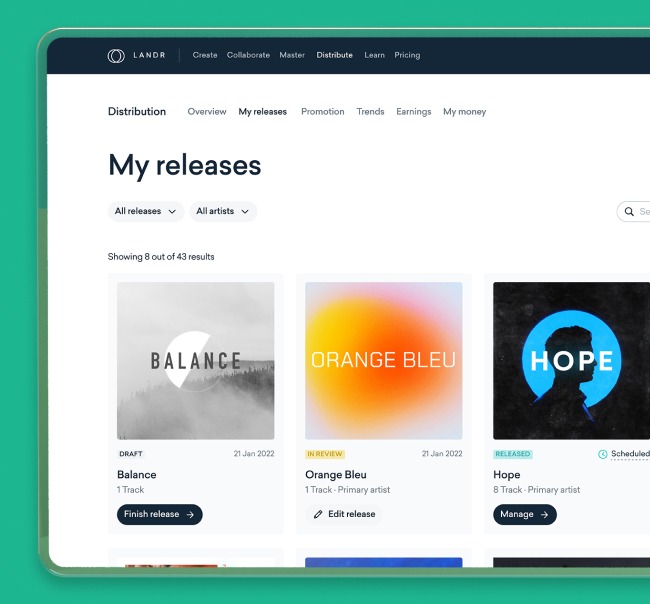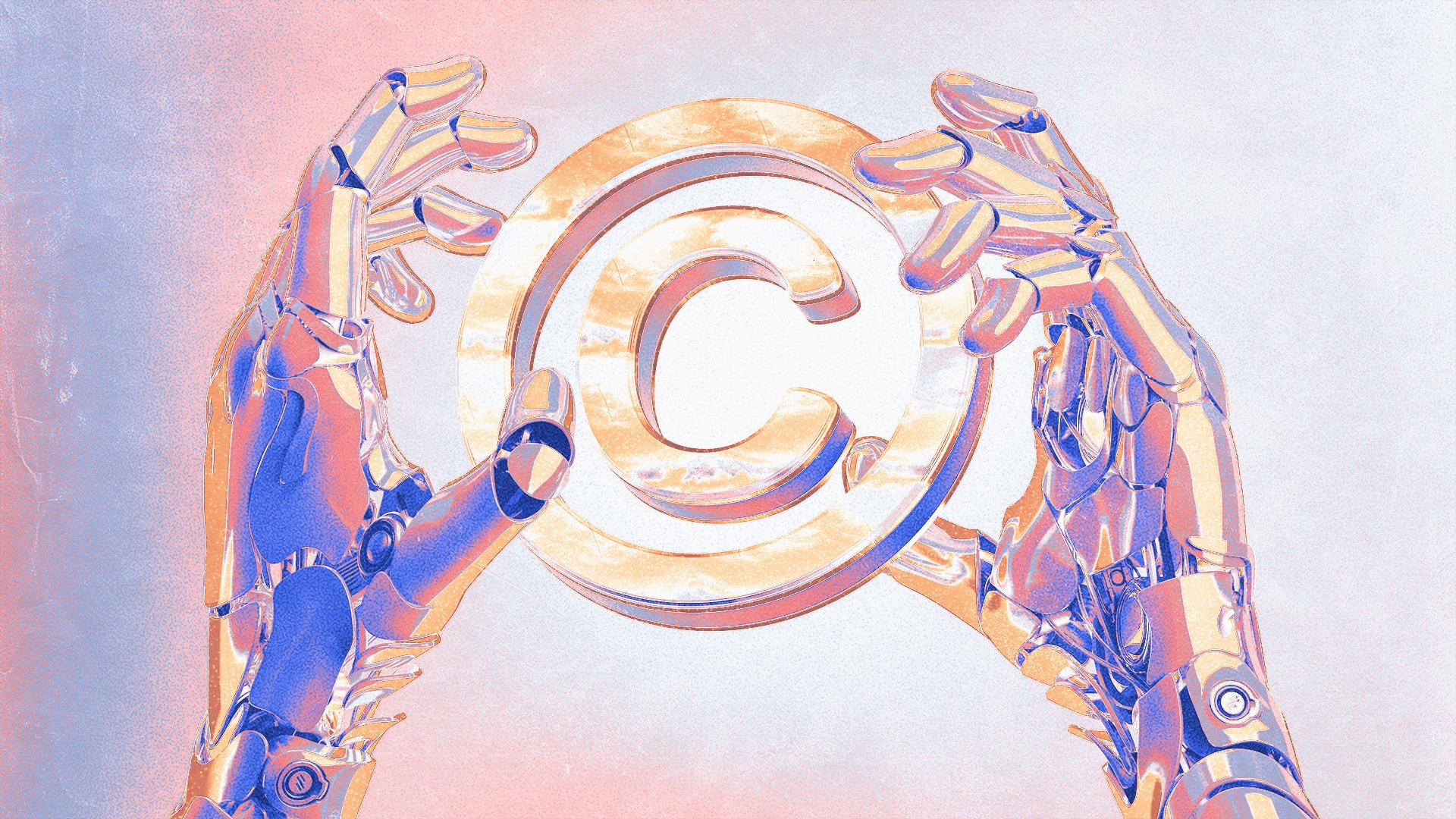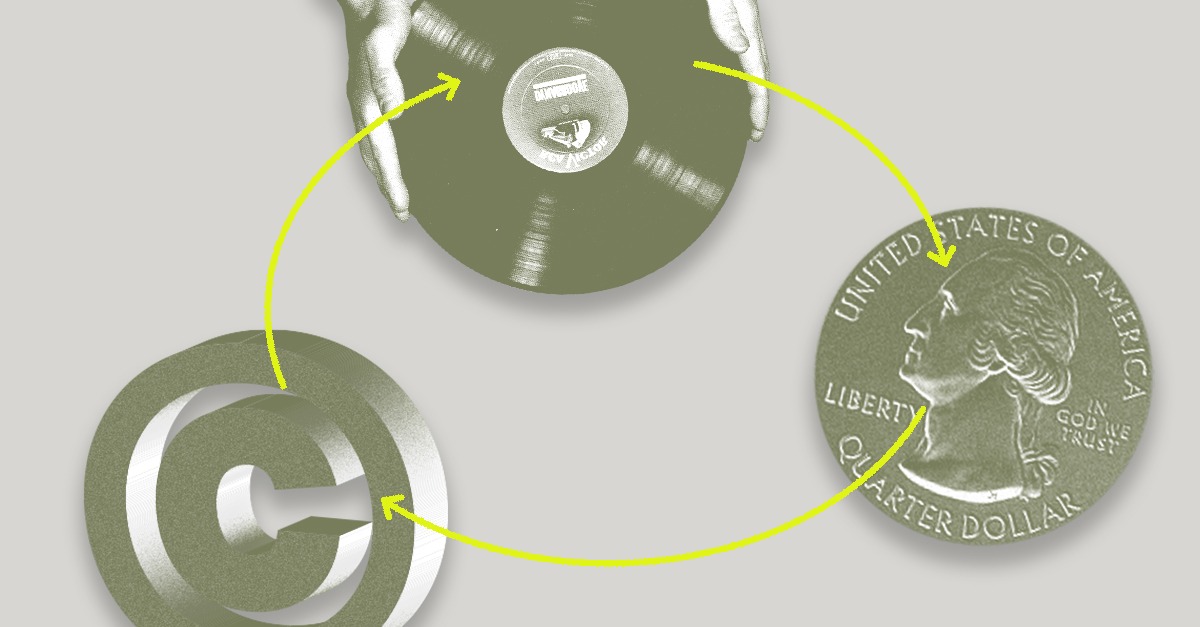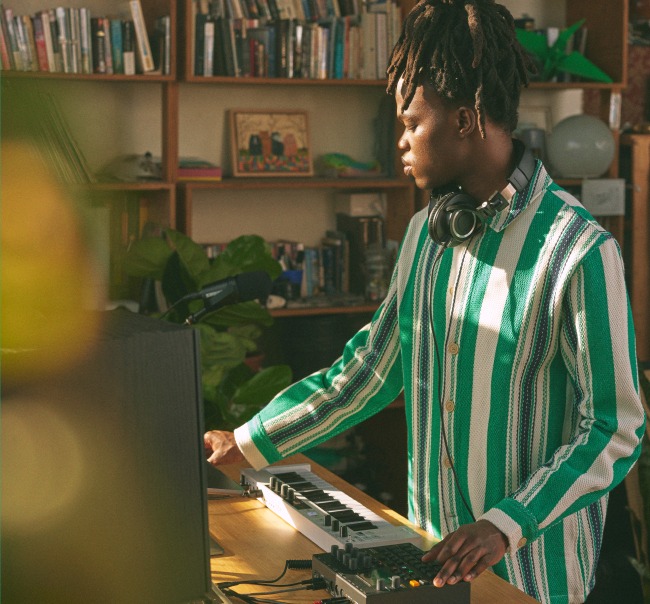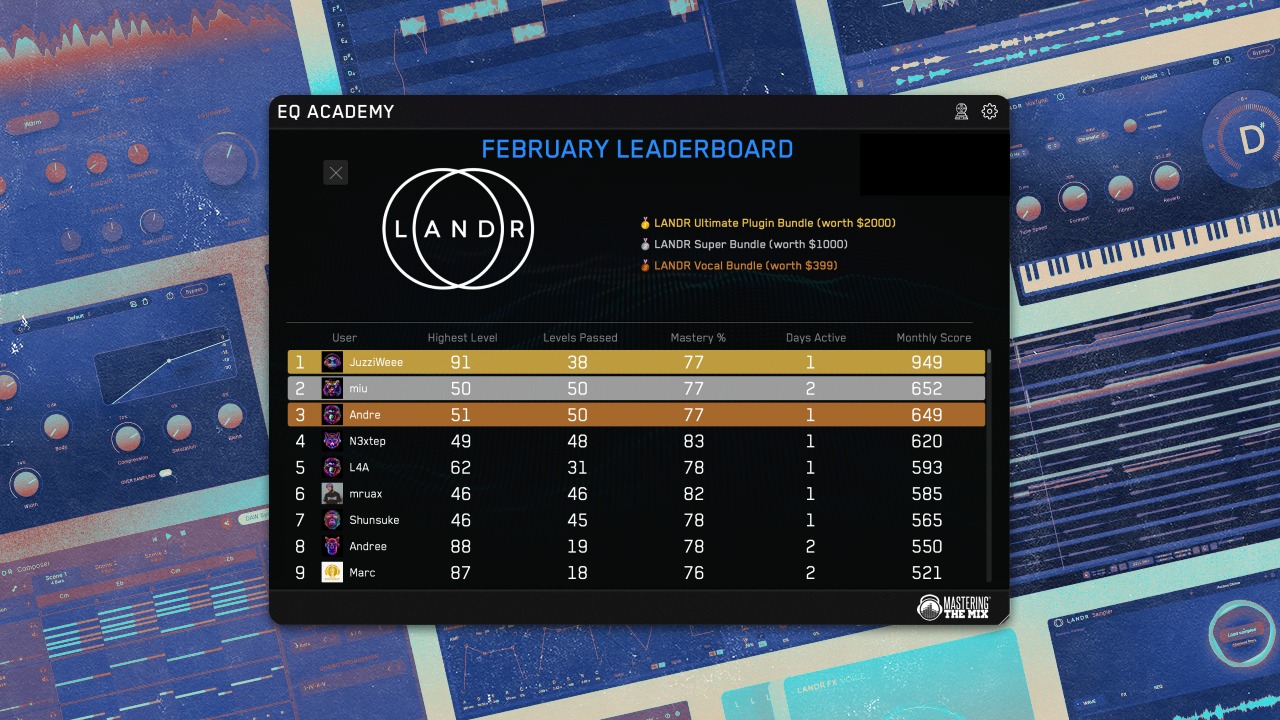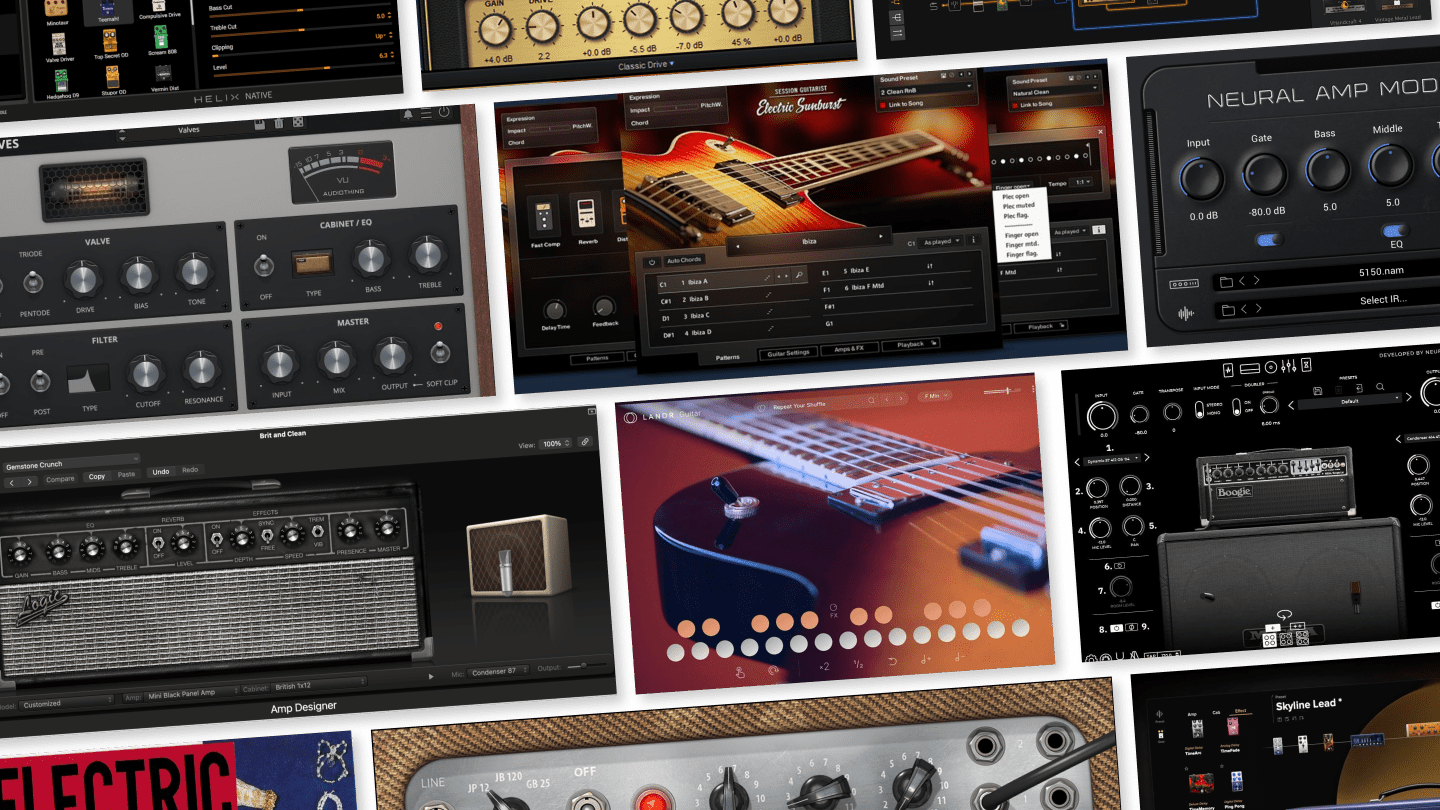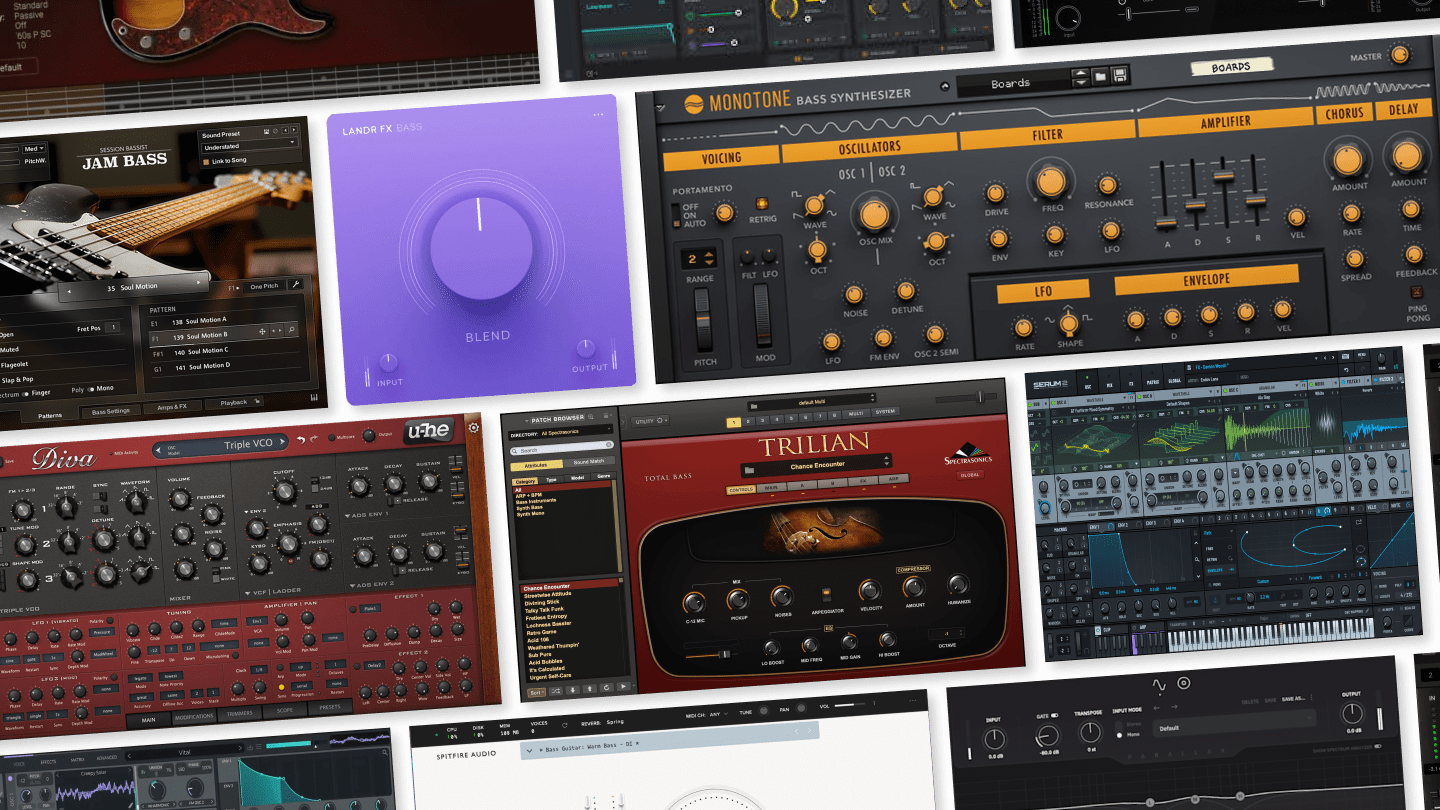
What Is Music Publishing? The Complete Beginner’s Guide

When it comes to earning royalties, music publishing is an essential topic to understand.
It can, however, be a bit tricky to figure out.
Our guide breaks it down in simple terms, and by the end, you’ll know whether or not a music publishing deal is right for you.
Ready? Let’s dive in.
Table of Contents
- What is music publishing?
- Music copyright essentials
- What is a music publishing deal?
- Do I need a music publishing deal?
- Songwriter royalties in music publishing
- Collecting societies in music publishing
- How are publishing royalties calculated?
- How are publishing royalties split?
- Is a music publishing deal worth it?
Note: This article is for informational purposes only and is not to be taken as legal advice.
What is music publishing?
Music publishing is the business of managing the copyright and royalties that are related to music compositions. Music publishers work with songwriters to ensure that any time one of their compositions is used, performed, or reproduced, the copyright is respected and the songwriter is paid accordingly.
Examples of music publishing companies include Sony Music Publishing and Kobalt.
Music publishers are essentially middle-organizations that collect songwriter royalties from collecting societies and other parties on behalf of the songwriter. Therefore, they take a commission from the royalties they collect.
Depending on where you are in your career, paying this commission from your royalties may or may not be worth the cost.
Before we go in depth about how music publishing works, let’s get a quick handle on the basics of music copyright.
Music copyright essentials
Music copyright is divided into two main areas: compositions and master recordings.
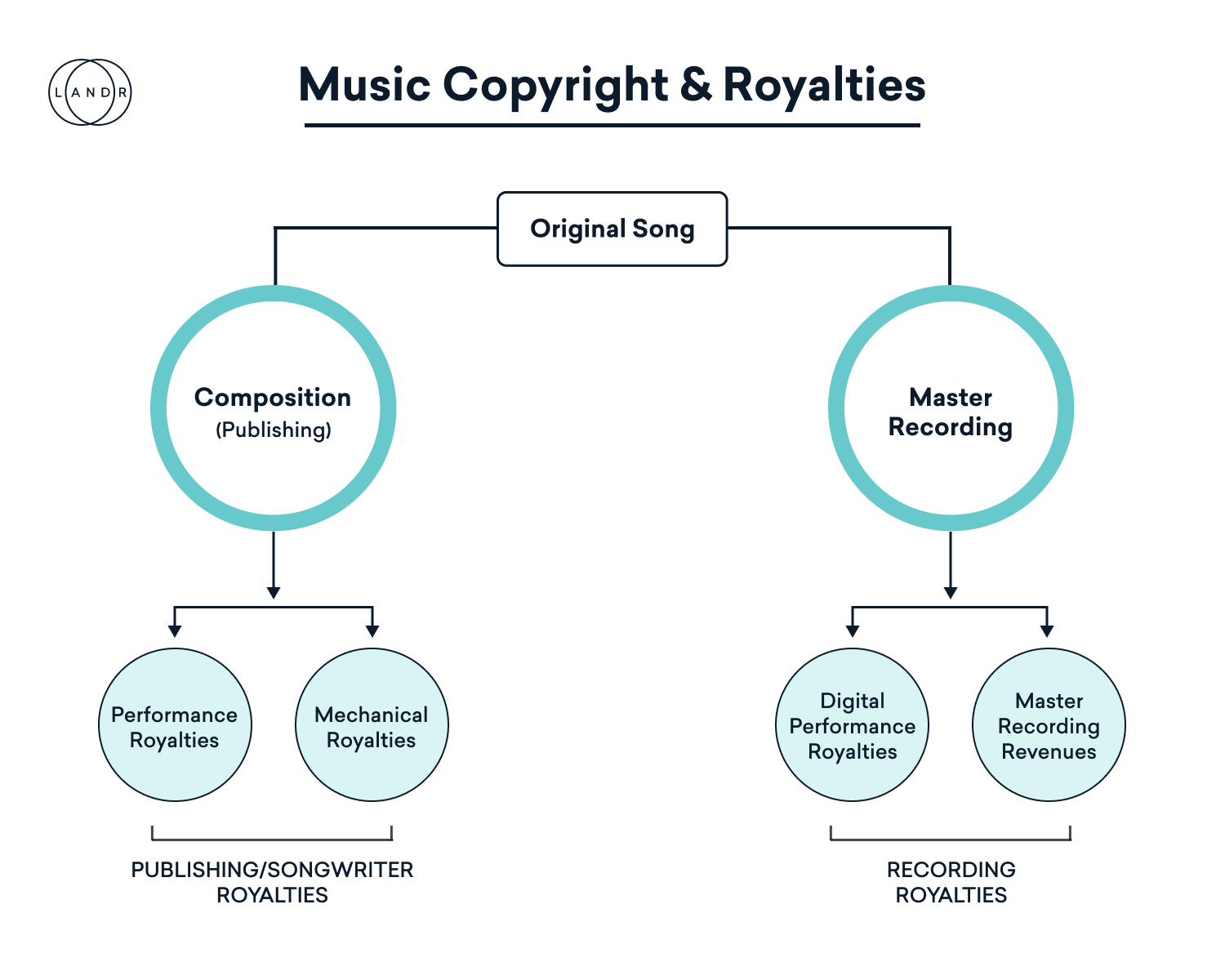
A basic overview of the main types of music copyright and royalties.
Click here for full size.
Key terms
Music composition – The core creative material that defines a piece of music — structure, melody, harmonies, rhythm, lyrics, etc.
Songwriter(s) – The people who are credited for (and own rights to) music compositions.
Composition/publishing rights - The rights held by songwriters and music publishers over compositions.
Publishing/songwriter royalties – Royalties paid to songwriters and music publishers for the use of compositions.
Collecting societies - Organizations that collect publishing royalties from the source and dispense them to songwriters and publishers.
Master recordings
Master recording – The recording (or production) of a music composition.
Recording artist(s) – The people who are credited for (and own rights to) master recordings.
Master/recording rights - The rights held by songwriters and music publishers for the use of recordings.
Recording royalties - Royalties paid to recording artists and labels for the use of recordings.
Music publishers only deal with composition rights and songwriter royalties, so that’s what we’ll be focusing on in this article.
Now let’s take a look at music publishing deals and how they work.
What is a music publishing deal?
A music publishing deal is an agreement between a music publisher and one or more songwriters. It outlines who will own what share of rights over music compositions and who gets what percentage of the collected royalties.
Two major types of music publishing deals are co-publishing deals and administration deals.
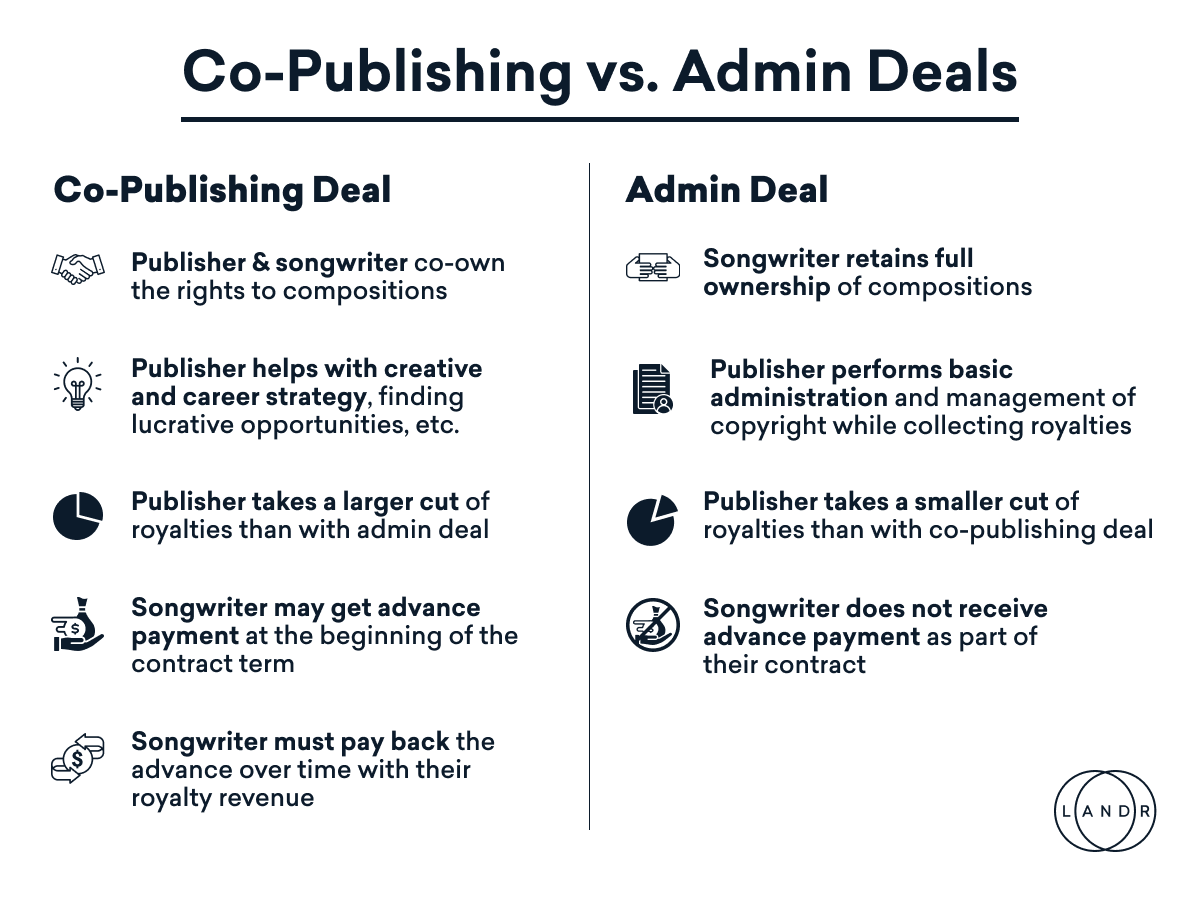
A basic comparison between co-publishing deals and admin deals.
Click here for full size.
While there are more types of publishing deals in the industry, these two tend to be the most common.
Co-publishing deals are typically more suited to songwriters with larger followings and more widespread use of their compositions.
Admin deals are more suited to songwriters who don’t yet need advanced services but want to offload the work of royalty collection and management to a professional.
Do I need a music publishing deal?
In a standard music industry deal, a well-established artist usually co-owns their compositions with a music publisher, while their label owns the master recordings.
This is because, once your music reaches a certain level of recognition and demand, it’s worthwhile to have someone else manage things in exchange for a slice of the pie.
However, it’s more common than ever for artists to write, produce, and release their music entirely on their own.
This means you can:
- Release independently through a distributor
- Retain full ownership of both your compositions and masters
- Collect recording royalties from your distributor
- Collect publishing royalties directly from collecting societies
While it might take more work to get your royalties directly from collecting societies, you’ll earn more by cutting out the middleman.
If you do end up seeking out a publishing deal, never pay someone upfront to collect and manage your royalties and copyright.
Any service that a music publisher provides you should be paid for through a commission on your royalties only.
Alright, let’s zoom in a bit further on publishing/songwriter royalties.
Songwriter royalties in music publishing
There are two main types of songwriter royalties: performance royalties and mechanical royalties.
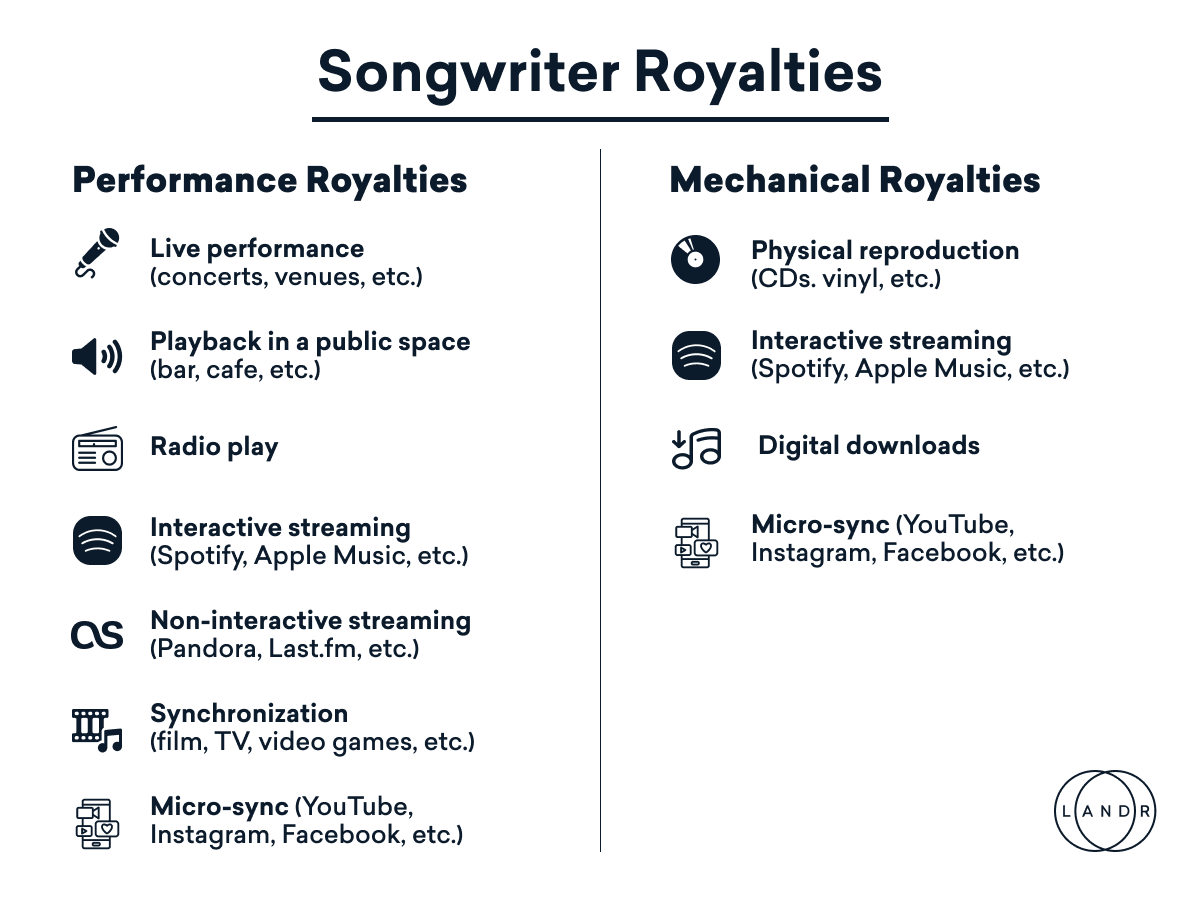
Click here for full size.
Performance royalties are collected for the live performance or playback of compositions.
Mechanical royalties are collected for the digital or physical reproduction of compositions.
When a composition is licensed to be used in media like TV, film, advertising, or video games, this generates a type of performance royalty called sync royalties.
Sync royalties are collected over time as the media content is aired or broadcast. This is in addition to a one-time sync licensing fee that is paid to the publisher and/or songwriter upfront.
A subset of sync royalties are are micro-sync royalties, which are specific to platforms like YouTube and TikTok.
Collecting societies in music publishing
Collecting societies are organizations that register and maintain the rights of music compositions while collecting royalties for their members (songwriters and publishers).
The three types of collecting societies are:
- Performing rights organizations (PROs)
- Collective management organizations (CMOs)
- Mechanical rights organizations (MROs)
PROs deal specifically with performance rights and performance royalties, and they’re specific to the United States and Canada. Examples include ASCAP, BMI, SESAC, and SOCAN.
CMOs are the equivalent to PROs in most countries outside the US and Canada. Examples include GEMA in Germany, SACEM in France, and PRS for Music in the UK.
MROs deal specifically with mechanical rights and mechanical royalties. Examples include Harry Fox Agency and Music Reports.
In addition to these, the US Copyright Office created the Mechanical Licensing Collective (MLC) in 2021. This is basically an MRO specializing in the collection of publishing royalties from streaming and digital downloads in the United States.
So, with all this talk about royalties, you’re probably wondering…
How are publishing royalties calculated?
Performance royalties are calculated by collecting societies, who each use their own formulas to do so. These formulas can be quite complex and involve a wide range of variables and modifiers depending on each situation.
Mechanical royalties are also calculated based on many factors, including:
- The format of the music
- The formula being used to make the calculation
- The legal factors specific to the region
Sync royalties will typically be calculated based on:
- The total runtime for which the song is used
- The perceived value of the song for the licensor
- The perceived value of its placement for the songwriter
- Other factors in the negotiated agreement
Naturally, you might be wondering what percentage of royalties you get and what percentage would go to a music publisher.
How are publishing royalties split?
If the songwriter has a publishing deal, the exact percentages will vary depending on the nature of the deal.
Here’s a basic overview of how royalties flow from collecting societies to songwriters and publishers:
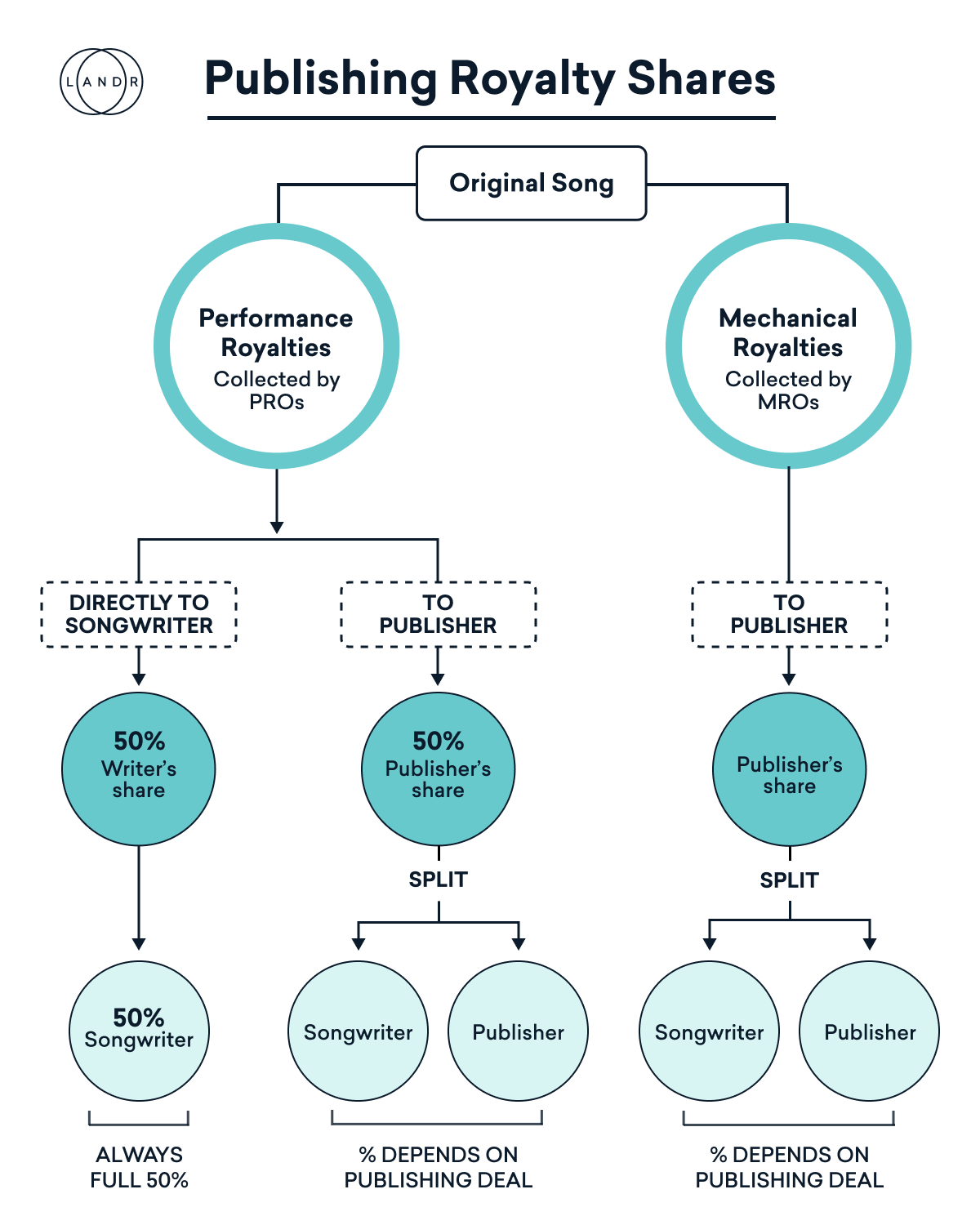
Click here for full size.
In a standard co-publishing deal, the publisher might take 25% of all royalties while the songwriter keeps 75%.
In a standard admin deal, the publisher might take around 10-20% of all royalties while the songwriter keeps the rest.
One thing, however, never changes — the songwriter always collects at least 50% of performance royalties. This writer’s share is not touched by the publisher.
Finally, if the songwriter does not have a publishing deal, they are essentially considered to be self-published.
They can therefore directly collect 100% of both writer and publisher shares of both performance and mechanical royalties.
Now that we’ve gotten a lot of technical mumbo jumbo on the table, let’s help you draw a practical conclusion.
Conclusion: Is a music publishing deal worth it?
Ultimately, a music publishing deal is only worth the cost if your music has gained enough popularity to require professional royalty collection and copyright management.
In fact, it can often be difficult to get a lucrative music publishing deal if you’re not already well-established as a songwriter.
Before you get to that point, focus on producing great music, use a distributor to self-release it and earn streaming/download royalties, and promote it consistently to build your following.
For songwriters on this path, it’s often recommended to register your music with a PRO or CMO to collect your performance royalties yourself.
Here are some examples by region:
If you’re looking for other ways to earn money from your music, LANDR has developed a new model for sharing music revenue.
We recommend looking into our Fair Trade AI Program if you’re interested. It’s a free and optional program for anyone releasing their music through LANDR Distribution.
In the meantime, keep making great music!
Gear guides, tips, tutorials, inspiration and more—delivered weekly.
Keep up with the LANDR Blog.
